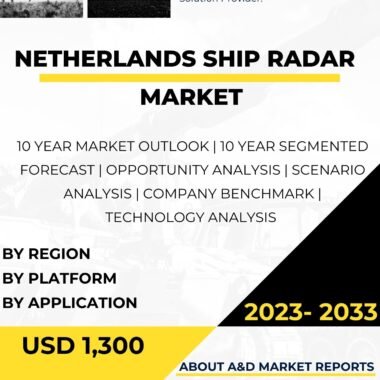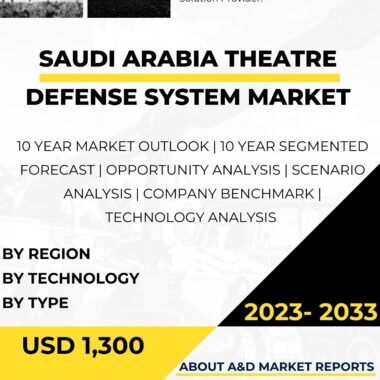Description
The Saudi Arabia Military Sensors Market is a crucial and rapidly growing segment within the country’s defense industry. Military sensors are advanced electronic devices designed to detect, track, and analyze various targets and phenomena, providing critical data for military operations. As a key player in the Middle East region, Saudi Arabia recognizes the strategic importance of adopting cutting-edge sensor technology to enhance its military capabilities and safeguard national security.
The Saudi Arabia Military Sensors Market is characterized by a mix of international and domestic companies that specialize in sensor development and manufacturing. International defense giants, such as Lockheed Martin, Raytheon, and Thales Group, have a significant presence in the market and offer a wide range of advanced military sensor solutions.
One of the primary drivers of the Saudi Arabia Military Sensors Market is the Royal Saudi Armed Forces’ (RSAF) commitment to modernizing its military capabilities. Military sensors play a critical role in enhancing situational awareness, intelligence gathering, and target acquisition for various branches of the military. The RSAF’s focus on modernization is driven by the need to counter potential threats, address regional security challenges, and adapt to evolving warfare scenarios.
Moreover, as a leading regional military force, the RSAF actively participates in international military operations and coalition efforts. Modern and sophisticated sensors are essential for the RSAF to effectively carry out joint and coalition operations, ensuring seamless integration with partner forces.
The Saudi government’s Vision 2030 economic diversification plan also influences the Military Sensors Market. As part of this vision, Saudi Arabia aims to develop a robust domestic defense industry capable of contributing significantly to the national economy. This includes fostering partnerships and joint ventures with international defense companies for technology transfer and knowledge sharing.
Localization of sensor manufacturing aligns with the broader goal of creating high-skilled job opportunities for Saudi citizens and promoting research and development within the country.
The RSAF’s focus on modernizing its military sensors capabilities involves exploring the acquisition and development of advanced sensors across various domains. These sensors encompass a wide range of technologies, including radar systems, electro-optical/infrared (EO/IR) sensors, acoustic sensors, chemical and biological sensors, and electronic warfare (EW) systems.
The effective integration of military sensors into the RSAF’s existing defense infrastructure demands careful planning and coordination. Ensuring interoperability among different sensor platforms, providing comprehensive training for operators, and establishing secure and reliable data links are essential for maximizing the sensors’ utility and effectiveness.
However, the Saudi Arabia Military Sensors Market also faces challenges. Developing and acquiring advanced sensors requires substantial financial investment and continuous research and development efforts to stay at the forefront of technological advancements. The RSAF must balance its operational requirements with budget constraints to ensure the acquisition of cost-effective and cutting-edge sensor solutions.
Moreover, sensor technology is continually evolving, and there are technical and engineering challenges that need to be overcome. Issues related to sensor miniaturization, power efficiency, data processing, and information fusion must be addressed to ensure the reliability and performance of sensors in various operational scenarios.
In conclusion, the Saudi Arabia Military Sensors Market is a vital and evolving component of the country’s defense industry. As the RSAF continues to modernize its military capabilities and enhance its sensor capabilities, the demand for advanced sensors is expected to grow.
International defense companies with expertise in sensor development and manufacturing will continue to play a significant role in this market. However, the Saudi government’s focus on economic diversification and indigenous defense industry development will drive increased collaboration and technology transfer initiatives.
By fostering local research and development, training programs, and investments in sensor technology and infrastructure, Saudi Arabia aims to build a robust and self-sufficient defense sensor sector, ensuring the RSAF remains operationally effective and prepared to meet future challenges.
As the Kingdom seeks to maintain regional stability and safeguard its national interests, the Military Sensors Market will remain a critical area of focus within the broader defense modernization efforts.




